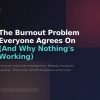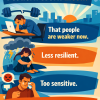
I Don't Know How to Write About Imposter Syndrome Without Sounding Like I Have It Figured Out
You know you have it. Naming it doesn't make it stop. Here's what actually helps when your brain keeps telling you everyone's about to figure out you don't belong.
I've started this post three times. First version was too advice-y. Second one was just me complaining for 600 words. This is attempt three and I'm not sure it's going to be better but whatever, shipping it anyway.
So: imposter syndrome. You have it, I have it, that one guy on your team who seems weirdly confident probably has it too but he's just better at hiding it. And the thing nobody tells you is that knowing you have imposter syndrome doesn't actually help? Like cool, I can name the thing, I'm still refreshing my email at 11pm waiting for someone to reply and tell me I'm wrong about something.
The reason I'm writing about this under the calm and confident under pressure thing is because you literally cannot be calm when your brain is running a background process that says "everyone's about to figure out you don't belong here." It's like trying to meditate while someone's poking you. The pressure isn't just the work pressure, it's the pressure of pretending you deserve to be doing the work pressure.
I talked to someone last week who's been in her role for eight years and she still feels like she's faking it. Eight years! At what point does your brain accept that you're actually qualified? Apparently never.
The Zone Thing Nobody Mentions
Here's what makes imposter syndrome worse: it shows up differently depending on your capacity level. And nobody talks about this because most advice assumes you're operating with full brain power. You're not.
In 🟢 Green Zone (when you're actually clear and focused), imposter syndrome is annoying but manageable. You can catch yourself spiraling and be like "okay brain, we've been over this." It's still there but you have the bandwidth to work around it.
In 🟡 Yellow Zone (managing but one fire away from overwhelm), imposter syndrome becomes your default narrator. Every task feels like evidence you're about to be exposed. You're apologizing for existing. Every email takes 20 minutes because you're trying to sound competent enough that no one notices you're drowning.
In 🔴 Red Zone (system flooded, making mistakes), imposter syndrome isn't even a thought anymore — it's just reality. You ARE screwing up because your brain is fried. And now you can't tell if it's imposter syndrome or if you're actually bad at your job. Which makes everything worse.
The brutal truth: You can't fix imposter syndrome with better self-talk if you're operating in Yellow or Red zone. Your brain doesn't have the capacity for it. You need different tools for different zones.
What Even Causes This
There's that Dunning-Kruger thing where incompetent people think they're great and competent people think they're bad. Which is deeply unfair and also explains every meeting I've ever been in where the loudest person was completely wrong.
The problem is your brain sees someone else's confidence and assumes they must know something you don't. Meanwhile they're probably just less self-aware or they're faking it too. There's no way to know! That's what makes it so exhausting.
I read somewhere that 70% of people experience imposter syndrome. Which honestly feels low? Maybe the other 30% are just the people who don't know what it's called.
Also there's this thing where the more you learn, the more you realize how much you don't know. So you're literally punished for being competent by feeling less competent. Great system, evolution, really nailed it there.
The Part Where I'm Supposed to Give You a Solution
Okay so I don't have a perfect solution because if I did I wouldn't be writing this at 10pm on a Sunday. But here's what I've noticed works sometimes:
Get the spiral outside your head before it becomes your whole personality
When you catch yourself in the "I'm going to be exposed as a fraud" loop, you have to externalize it. Write it down, say it out loud, voice memo in your car, whatever. Just get it out where you can actually look at it instead of drowning in it.
Because once it's external you can be like "okay is this actually true or is this just my brain being dramatic?" Most of the time it's your brain being dramatic. But you can't see that when it's just swirling around in there.
I don't know why that works but it does. But only if you're in Green or Yellow zone. If you're in Red, you don't have the capacity to reason with yourself. You need to step away and reset your nervous system first.
Match the tool to the zone you're actually in
🟢 Green Zone tool: Evidence gathering. When your brain says "I'm a fraud," list 3 things you did this week that required actual skill. Not to feel better, just to fact-check your brain.
🟡 Yellow Zone tool: Pre-write the apology language out of your emails. Seriously, write "I might be wrong but" and then delete it before you can send. Your brain wants to hedge, don't let it.
🔴 Red Zone tool: Stop trying to fix your thinking. You can't. Take a 5-minute walk, get water, break the loop. Come back when you're in Yellow and then you can work on it.
Work Benefits I Guess
If you can shut down the imposter voice faster, you make better decisions because you're not second-guessing everything into paralysis. Also you stop sounding unsure all the time. Every time you say "this might be a dumb question" or "I'm probably wrong but" you're basically apologizing for existing and people read that as you not knowing what you're talking about, even when you do.
Companies lose stupid amounts of money on people who are good at their jobs but too busy panicking to do them. Gallup has numbers on this, something about engagement and billions of dollars. I don't remember the exact stat but you know it's true because you've watched yourself do it.
Also most workplace pressure isn't actually that high-stakes? We just treat it like it is because we're terrified of being found out. If you can separate real pressure from imposter pressure the job gets way easier.
The thing that actually matters: imposter syndrome gets worse as your capacity drops. It's not a personality flaw. It's what happens when you try to perform confidence while operating in Yellow or Red zone. The fix isn't better self-esteem — it's tools that work when your brain is already compromised.
Try the Free 30-Minute Reset
There's a free 30-minute reset you can try if you want to actually work on this instead of just nodding and then going back to spiraling. You pick a pressure point, we map what zone you're in, you get a tool that works for that capacity level. It's designed for exactly this kind of thing — the calm and confident under pressure stuff that matters way more than people admit.
Start Your Free 30-Minute Reset
If it helps there's a subscription. $34.99/month if you want to test it, $299/year if you're going annual which is obviously cheaper but I get that committing to a year feels like a thing when you already think you're not qualified to be helped. Which is very on-brand for imposter syndrome actually.
Main thing is just try the reset. Worst case you spend 30 minutes and nothing changes. Best case you get a tool that works in the zone you're actually in instead of the one you wish you were in.
Things I Should Probably Link But Might Not
- Original imposter syndrome research is Clance & Imes from 1978
- Dunning-Kruger is a real study, you can Google it
- Gallup does workplace reports, they're somewhere on their site
- The Zones Framework explains why capacity matters more than confidence
I was going to find the actual links but honestly if you're curious you'll look them up and if you're not then having the link here doesn't matter.
The thing I actually want you to take away from this: you're not an imposter, your brain is just loud and you don't have a system for managing it that works in different capacity zones. The brain's not going to get quieter on its own. And traditional advice assumes you have Green zone capacity to implement it. You don't.
Try the reset or don't but if you're reading this at midnight because you're already worried about Monday maybe just try it?
I'm going to stop writing now before I start second-guessing this whole post which would be extremely on-theme but not helpful.









